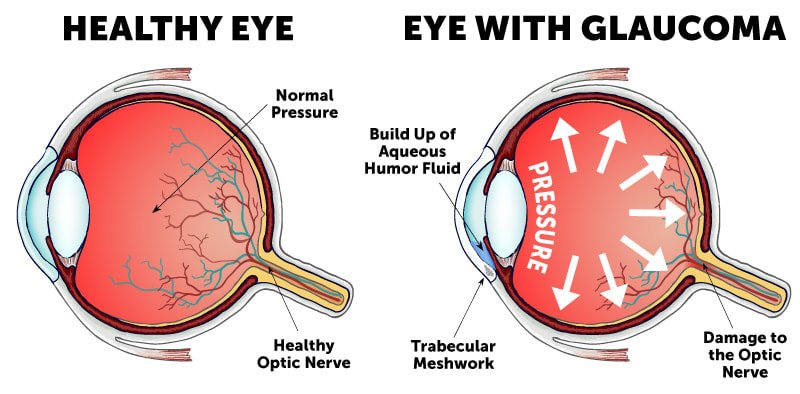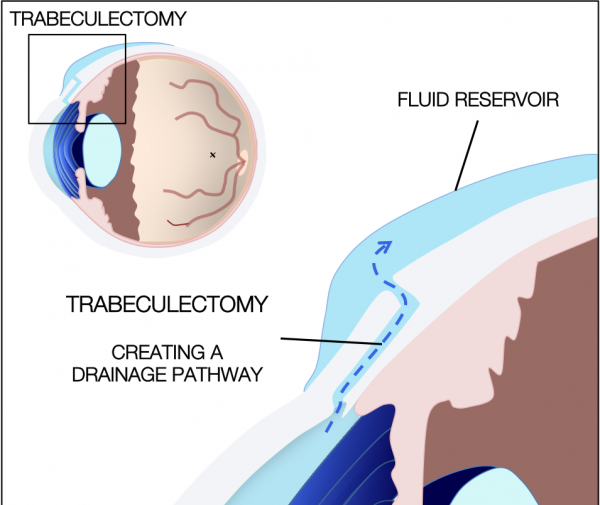

Glaucoma
Glaucoma is a group of eye diseases that can cause vision loss and blindness by damaging a nerve in the back of your eye called the optic nerve. The symptoms can start so slowly that you may not notice them. The only way to find out if you have glaucoma is to get a comprehensive dilated eye exam. There’s no cure for glaucoma, but early treatment can often stop the damage and protect your vision
WHAT IS GLAUCOMA TREATMENT?
If you have glaucoma, it’s important to start treatment right away. Doctors use different types of treatment for glaucoma, including medicines (usually eye drops), laser treatment, and surgery. Treatment won’t undo any damage to your vision, but it can stop it from getting worse.
WHAT ARE DIFFERENT TYPES OF GLAUCOMA?
- Open-angle glaucoma
- Angle-closure glaucoma
- Congenital glaucoma.
What are the treatment options for Glaucoma?
Depending upon your eye condition, the doctor can advise you on the below treatment
1. Antiglaucoma drops
2. Laser treatment
3. Glaucoma surgery
What types of eye drops can help glaucoma?
Different types of eye drops can help to treat glaucoma. Before you start taking glaucoma medicines, tell your doctor about other medicines, supplements, or vitamins you take.
Glaucoma has been nicknamed the silent thief of sight because it often causes permanent vision loss before the disease is even detected. In its early stages, glaucoma does not typically present with any symptoms that would send you to your eye doctor with complaints of vision changes. Therefore, by the time you see your eye doctor, a large amount of vision loss has already occurred.
Glaucoma is a leading cause of blindness among African Americans and Hispanics in the U.S. Three times as many African Americans have glaucoma than Caucasians, and four times as many are blind. Between the ages of 45 and 64, glaucoma is fifteen times more likely to cause blindness in African Americans than in Caucasians. All people older than 60 are at a greater risk of developing glaucoma than people who are younger.
While glaucoma cannot be prevented completely, the most reliable way to prevent vision loss from glaucoma is by visiting your eye doctor for regular eye exams. Early detection of the disease can help to preserve your vision, and reduce vision loss.
There are also lifestyle changes you can make to reduce your risk of high eye pressure that leads to glaucoma:
- Eat a healthy diet
- Exercise
- Watch your caffeine intake
- Wear protective eyewear
- Avoid prolonged use of steroids
- Control blood pressure
- Maintain good oral health

Other types of eye drops work by lowering the amount of fluid your eye makes.
- Alpha-adrenergic agonists, like timolol
- Carbonic anhydrase inhibitors, like dorzolamide and brinzolamide
- Laser treatment. To lower your eye pressure, doctors can use lasers to help the fluid drain out of your eye. It’s a simple procedure that your doctor can do in the OPD.
Laser treatment can help treat some types of glaucoma.
Do I need laser treatment for my glaucoma?
A laser treatment called trabeculoplasty is used to treat open-angle glaucoma. There are other types of laser treatment that can treat other types of glaucoma.
Ask your eye doctor about all your glaucoma treatment options, including medicines, laser treatment, and surgery. You and your doctor can work together to make a treatment plan that’s right for you.
Surgery
Appointment Call
8806433400
If medicines and laser treatment work inadequately, your doctor might suggest surgery. There are several different types of surgeries that can help the fluid drain out of your eye. Surgery can’t cure glaucoma or undo vision loss, but it can help protect your vision and stop it from getting worse.
There are a few different types of surgeries for glaucoma that can help lower the pressure in your eye:
- Trabeculectomy
- Glaucoma implant surgery
- Minimally invasive glaucoma surgery (MIGS)

What is Minimally Invasive Glaucoma Surgery (MIGS)?
If you have mild glaucoma, your doctor might suggest a new technique known as minimally invasive glaucoma surgery (MIGS). This procedure also reduces eye pressure but comes with fewer risks and a quicker recovery time. Although glaucoma is a serious condition, the treatment is highly effective.
- If your doctor prescribes medicine, be sure to take it every day.
- Tell your doctor if your treatment causes side effects.
- See your doctor for regular check-ups.
- If you’re having trouble with everyday activities because of your vision loss, ask your doctor about vision rehabilitation services or devices that could help.
- Encourage family members to get checked for glaucoma, since it can run in families.

What is Trabeculectomy?
This type of surgery is usually used to treat open-angle glaucoma.The surgeon will create a tiny opening in the top of your eye. The opening will be under your eyelid, where no one will see it. This opening allows extra fluid in your eye to drain away, lowering pressure in your eye.

